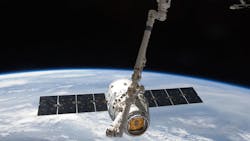UPDATE: SpaceX delayed its latest supply mission to the International Space Station on Monday due to a helium leak on its Dragon cargo capsule. "Today's launch is scrubbed due to a Helium leak on Falcon 9," SpaceX tweeted shortly before the planned blast-off from Cape Canaveral in Florida at 4:58 p.m. The tweet added that a fix would be implemented by the next launch opportunity on April 18.
WASHINGTON - The launch of a SpaceX rocket and its Dragon cargo capsule to the International Space Station will go ahead as scheduled Monday despite a glitch affecting a computer on the station, officials said.
The Falcon 9 rocket and its unmanned capsule Dragon is scheduled to blast off from Cape Canaveral in Florida at 4:58 p.m., SpaceX vice president Hans Koenigsmann said.
Weather forecasts indicated an 80% probability of conditions favorable for a successful launch, the third operated by the private space company. It had originally been scheduled for mid-March.
ISS program manager Mike Suffredini said a meeting had concluded "with a go for SpaceX-3."
"We had already determined that we were ready for the launch early last week, however, Friday afternoon one of our external MDMs failed," he said, referring to a backup command computer relay box.
There are around 10 MDMs on the space station, controlling automated systems on the base. A spacewalk will be required to repair the computer.
NASA was keen for the SpaceX rocket to fire its cargo to the base as quickly as possible.
"SpaceX is carrying on board a number of critical systems, including a new spacesuit, components to fix the existing spacesuits, a couple of very critical research experiments in the trunk and quite a bit of logistics for our crew members on board," Suffredini said.
"So we need to get it on board as soon as we practically can."
Owned by Internet entrepreneur Elon Musk, SpaceX became the first commercial entity to reach the space station with its Dragon cargo ship in 2012.
The company has a $1.6 billion contract with NASA for a series of future supply missions.
The Dragon, a reusable, gumdrop-shaped capsule, became the first commercial spacecraft to reach the ISS in 2012.
Copyright Agence France-Presse, 2014
About the Author
Agence France-Presse
Copyright Agence France-Presse, 2002-2025. AFP text, photos, graphics and logos shall not be reproduced, published, broadcast, rewritten for broadcast or publication or redistributed directly or indirectly in any medium. AFP shall not be held liable for any delays, inaccuracies, errors or omissions in any AFP content, or for any actions taken in consequence.
